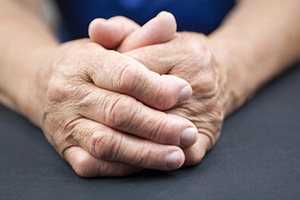 Arthritis is one of the most complicated conditions to understand. As an inflammatory disease, it’s your own immune system that attacks your joints, which causes the pain and stiffness.
Arthritis is one of the most complicated conditions to understand. As an inflammatory disease, it’s your own immune system that attacks your joints, which causes the pain and stiffness.
But what causes your immune system to act this way?
A new study reveals it is hormonal imbalance – which gives us hope that by balancing these hormones, arthritis can be drastically improved or cured.
Women are three or four times more likely than men to develop rheumatoid arthritis. This cries out for an explanation.
The fact that women are most likely to develop this disease between ages 45 and 75 suggests an obvious culprit: the postmenopausal drop of progesterone and estrogen, the two primary female sex hormones.
Unfortunately, the solution is not as simple as giving women hormonal therapy. In 2008 for example, an editorial in the journal Arthritis Care & Research surveyed several studies on the ability of hormonal therapy to reduce the incidence of rheumatoid arthritis, finding that the literature was at best mixed, but basically pessimistic.
This has not ended the conversation about female sex hormones and rheumatoid arthritis, though, probably because so many women with this disease have some relevant experience with regard to severity of disease activity.
The journal Nature Reviews Rheumatology recently published a study that captured some of this experience and attempted to draw conclusions from it.
Researchers from the University of Washington and the Cincinnati Veterans Administration Medical Center reviewed numerous existing studies, concluding that most pregnant and breastfeeding women with rheumatoid arthritis reported considerable relief for the duration of their pregnancies or breastfeeding periods. They also reported that their condition worsened just after delivery.
Hardly coincidentally, estrogen and progesterone increase during pregnancy and breastfeeding, and plummet following delivery.
To fit in with this theme, the Arthritis Care & Research editorial also cited some studies in which women reported reduced disease activity during the postovulatory phase of the menstrual cycle during which sex hormones are high.
Unfortunately, this is of little help to arthritis sufferers, as you can hardly stay pregnant through most of your adult life. Researchers might, someday, be able to use the findings to explain how female hormonal cycles increase and decrease inflammatory activity.
Until then, you are on your own, with a bit of help from the Department of Environmental Health Sciences at the University of Minnesota.
Its scientists have compiled a long list of foods that contain significant amounts of natural estrogen that may elevate your estrogen levels. These are the foods you want to eat when your arthritis starts to act up.
1. Legumes, including soy beans and soy derived products, beans, chickpeas, peas, and black-eyed peas.
2. Alfalfa. This is not exactly tasty, but cattle, sheep, chickens, and cows that graze on it can pass some to you in their meat and milk.
3. Whole grains like oats, rice, and barley.
4. Vegetables like potatoes, yams, carrots, celery, and beets.
5. Fruits like all citrus, apples, cherries, cucumbers, tomatoes, papaya, plums, dates, and olives.
6. Seeds like sunflower, sesame, and flax.
7. Herbs like fennel, garlic, licorice, parsley, and sage.
Hormonal imbalance is just one piece of the puzzle. But it proves that arthritis is mostly caused by factors that can be controlled naturally.

 Overcoming IBD
Overcoming IBD Multiple Sclerosis
Multiple Sclerosis Banishing Bronchitis
Banishing Bronchitis Gum Disease Gone
Gum Disease Gone Overcoming Onychomycosis
Overcoming Onychomycosis Neuropathy No More
Neuropathy No More The Prostate Protocol
The Prostate Protocol Brain Booster
Brain Booster
 Ironbound
Ironbound
 Solution for Shingles
Solution for Shingles
 The Bone Density Solution
The Bone Density Solution
 The Ultimate Healing Protocol
The Ultimate Healing Protocol
 The Parkinson's Protocol
The Parkinson's Protocol
 The Chronic Kidney Disease Solution
The Chronic Kidney Disease Solution
 Overthrowing Anxiety
Overthrowing Anxiety The Fatty Liver Solution
The Fatty Liver Solution The Hypothyroidism Solution
The Hypothyroidism Solution
 The End of Gout
The End of Gout The Blood Pressure Program
The Blood Pressure Program
 The Oxigized Cholesterol Strategy
The Oxigized Cholesterol Strategy
 Stop Snoring And Sleep Apnea Program
Stop Snoring And Sleep Apnea Program
 The Arthritis Strategy
The Arthritis Strategy The Vertigo & Dizziness Program
The Vertigo & Dizziness Program The 3-Step Diabetes Strategy
The 3-Step Diabetes Strategy Hemorrhoids Healing Protocol
Hemorrhoids Healing Protocol The Erectile Dysfunction Master
The Erectile Dysfunction Master Weight Loss Breeze
Weight Loss Breeze The IBS Program
The IBS Program The Insomnia Program
The Insomnia Program The Migraine and Headache Program
The Migraine and Headache Program The Neck Pain Solution
The Neck Pain Solution The Menopause Solution
The Menopause Solution The Ejaculation Master
The Ejaculation Master The TMJ Solution
The TMJ Solution The Acid Reflux Solution
The Acid Reflux Solution The Fibromyalgia Solution
The Fibromyalgia Solution The Psoriasis Strategy
The Psoriasis Strategy